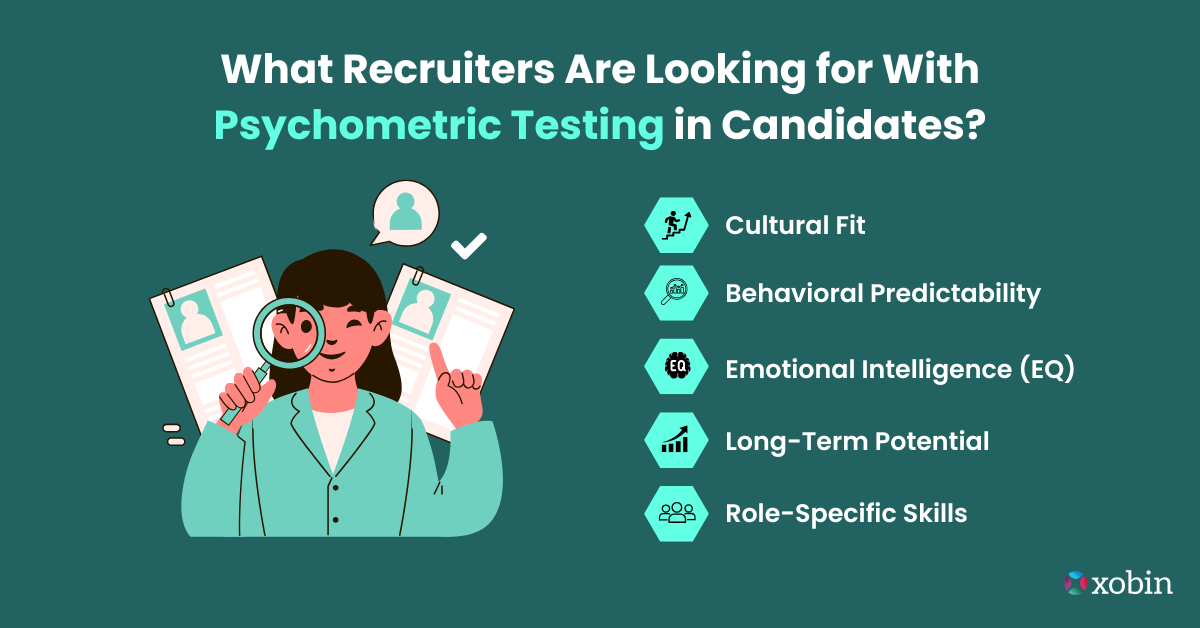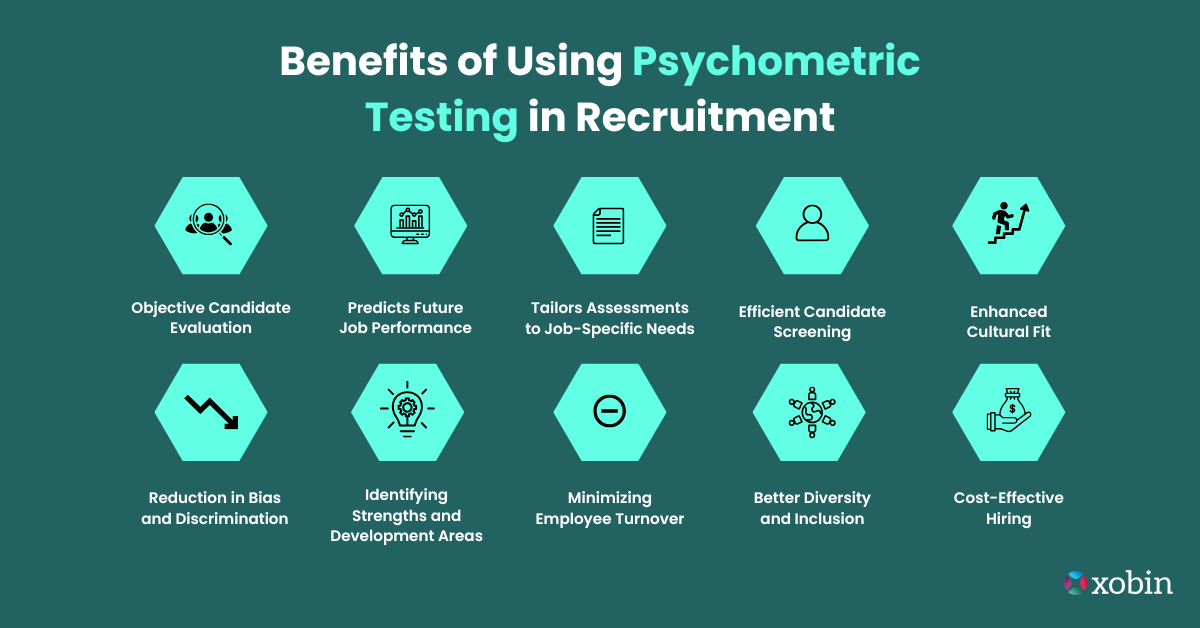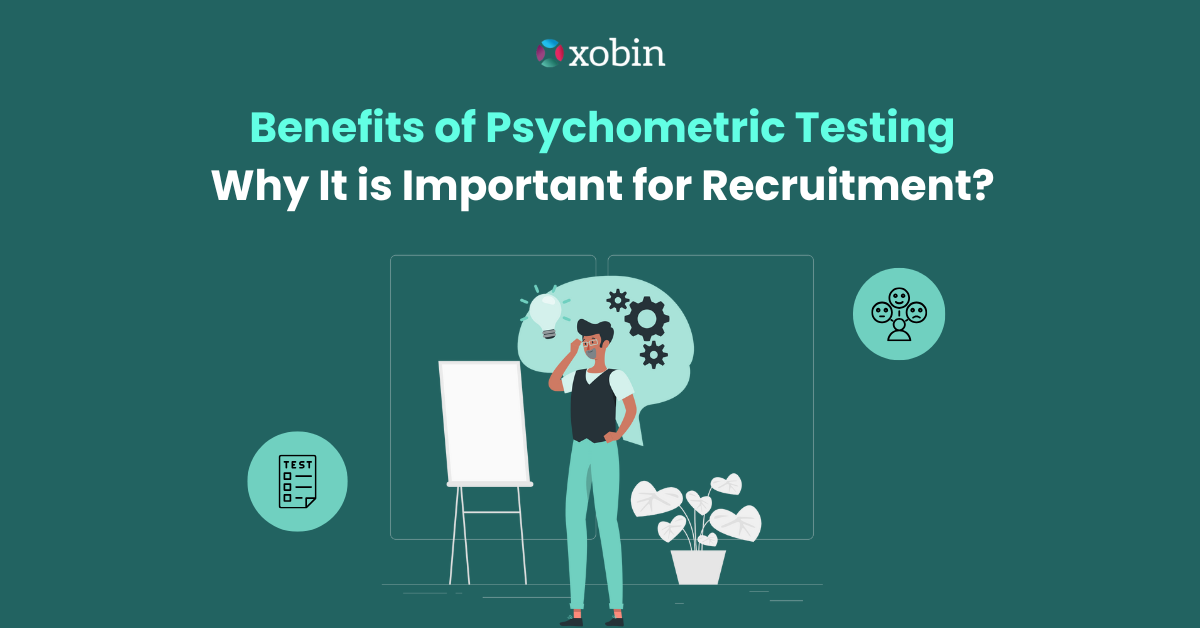Recruitment has transformed far beyond reviewing resumes and conducting interviews. A candidate’s CV might appear flawless, and their interview might go exceptionally well, but how can you truly determine if they are the best fit for the role? In today’s fast-paced hiring landscape, recruiters require advanced tools to identify candidates who not only meet qualifications but also align with the company culture. That is why they are turning to psychometric testing to make informed hiring decisions. But why is it so critical in recruitment? Let’s dive deep and uncover the benefits of psychometric testing in recruitment.
Table of Contents
What is Psychometric Testing?
Psychometric testing refers to a scientific approach to evaluating a candidate’s mental capabilities, personality traits, and behavioral tendencies. These tests go beyond what a resume can reveal and what an interview can uncover. They provide data-driven insights into how a candidate might perform in a role or fit within a company’s culture.
Psychometric tests are not your average “one-size-fits-all” solutions. They can assess:
- Cognitive abilities like critical thinking, problem-solving, and logical reasoning.
- Personality traits such as adaptability, emotional intelligence, and leadership tendencies.
- Soft skills, including communication and teamwork.
- Role-specific skills, tailored to the requirements of the job.
For instance, According to the British Psychological Society, over 75% of Fortune 500 companies use psychometric tests to refine their hiring decisions. That’s because psychometric tests predict job performance with remarkable accuracy. These tests measure various aspects, such as problem-solving skills, emotional intelligence, and leadership potential, making them an essential tool in modern recruitment. Moreover, combining psychometric assessments with traditional hiring methods can provide 360-degree understanding of a candidate. This ensures that the person hired is not only qualified but also aligns well with the team dynamics and organizational values.
What Recruiters are Looking for With Psychometric Testing in Candidates?

So, what exactly are recruiters hoping to find with psychometric testing? Let’s explore:
1. Cultural Fit
Hiring someone who matches the company culture can lead to higher employee satisfaction and retention. Psychometric tests analyze personality traits to determine if a candidate aligns with the team’s values and environment. For example, a candidate applying for a startup role may need to demonstrate adaptability and resilience, traits that psychometric tests can effectively measure.
2. Behavioral Predictability
Recruiters want to understand how candidates will behave under pressure or in collaborative settings. Psychometric assessments offer a glimpse into how individuals manage stress, communicate, and solve problems. A sales manager role, for instance, may require strong interpersonal skills and the ability to handle rejection gracefully—traits that are hard to gauge during an interview alone.
3. Emotional Intelligence (EQ)
Power skills are non-negotiable in today’s workplaces. Emotional intelligence, a key component of psychometric tests, helps assess how candidates interact with others, manage emotions, and resolve conflicts. It’s no surprise that leaders with high EQ outperform their peers by 20%, according to TalentSmart research.
4. Long-Term Potential
One of the biggest pain points for recruiters is high turnover. A LinkedIn study found that 89% of bad hires stem from attitude or behavioral issues rather than technical incompetence. Psychometric testing helps identify candidates with the right mindset and growth potential, ensuring they can thrive in the long run.
5. Role-Specific Skills
Recruiters also use psychometric tests to measure technical and role-specific skills. Whether it’s coding proficiency for a software engineer or problem-solving abilities for a product manager, psychometric testing can provide targeted insights that ensure a perfect match for the job requirements.
Benefits of Using Psychometric Testing in Recruitment

There are plethora of psychometric testing benefits for recruiters. Let’s break them down in detail:
1. Objective Candidate Evaluation
One of the main benefits of psychometric testing is its ability to bring objectivity to the recruitment process. Traditional interviews can be highly subjective, with interviewers basing their decisions on their personal biases or unconscious preferences. Psychometric tests, on the other hand, provide a data-driven approach and offer concrete insights into a candidate’s capabilities. Since these tests are standardized and reliable with psychometric properties, they measure all candidates on the same scale. Therefore, ensuring fairness and eliminating biases related to factors like gender, age or ethnicity. This objectivity helps recruiters focus on what really matters, the candidate’s ability to perform the job, rather than subjective impressions.
2. Predicts Future Job Performance
While qualifications and experience provide insight into a candidate’s past performance, psychometric testing can give you a glimpse into their future potential. Cognitive ability tests, for example, can predict how well a candidate might perform in tasks requiring critical thinking, problem-solving, and creativity. These assessments provide a more accurate reflection of how a candidate is likely to handle challenges in the workplace.
For example, a candidate may have worked in a similar role before, but psychometric testing can reveal their true potential for growth, innovation, and adapting to new environments. This forward-looking perspective helps you choose candidates who are not only qualified but also capable of excelling in the future.
3. Tailors Assessments to Job-Specific Needs
Not all roles are created equal. Different positions require different skills and personality traits. While some jobs may demand exceptional technical expertise, others may place a higher value on leadership abilities, creativity or communication skills. Psychometric testing can be tailored to the specific requirements of the role, ensuring that the assessment is aligned with the skills and characteristics needed for success in the job. Whether you’re hiring for a software developer, a customer service representative, or a senior executive, psychometric testing can be customized to assess the qualities that matter most for each role.
4. Efficient Candidate Screening
In large-scale recruitment, the volume of applications can be overwhelming. Psychometric testing helps streamline the screening process by quickly identifying the most suitable candidates. With predefined benchmarks and scores, hiring managers can focus on a smaller pool of high-potential candidates, saving valuable time and resources in the initial stages of recruitment.
5. Enhanced Cultural Fit
Every organization has its own unique work culture. Whether it’s a fast-paced environment, a collaborative setting, or a more independent workplace, it’s essential to hire individuals who will thrive in that culture. Psychometric testing can be a powerful tool in assessing a candidate’s behavioral tendencies and values. By evaluating traits like teamwork, leadership potential, adaptability, and motivation, recruiters can get a better sense of whether the candidate aligns with the organization’s culture and values. This ensures that new hires are more likely to succeed and stay longer, reducing turnover and boosting employee satisfaction.
6. Reduction in Bias and Discrimination
By providing a standardized way to assess candidates, psychometric testing can reduce unconscious bias and discrimination during the recruitment process. Since the tests focus on measurable characteristics such as ability and personality, it minimizes the impact of factors like age, gender, or ethnicity that may unintentionally influence hiring decisions. This promotes diversity and inclusivity within the workforce.
7. Identifying Strengths and Development Areas
Psychometric tests can also be used beyond recruitment to assist in employee development. By understanding a candidate’s strengths and areas for improvement, organizations can tailor training and development programs to address skill gaps. These tests also offer insight into how employees are likely to handle various challenges in the workplace, helping to develop more effective leadership and team-building strategies.
8. Minimizing Employee Turnover
Employee turnover can be an expensive concern for many organizations. Hiring the wrong person can result in disengagement, poor performance, and ultimately, high turnover rates. Psychometric testing helps reduce turnover by ensuring that the candidates you hire are a good fit for the role and the company culture. It also helps identify potential red flags early on, such as traits that may lead to dissatisfaction or underperformance. By using psychometric assessments, you’re more likely to make better hiring decisions, which means fewer costly mistakes and a more stable workforce.
9. Better Diversity and Inclusion
Diversity and inclusion are critical in today’s workplace. Psychometric testing provides a level playing field for all candidates, regardless of their background or personal circumstances. Because psychometric tests are based on objective data, they help eliminate biases that may affect diversity, ensuring that you’re hiring the best talent based on skills and potential, rather than preconceived notions. This helps create a more diverse and inclusive workforce, which can improve creativity, innovation, and overall company performance.
10. Cost-Effective Hiring
While psychometric testing may seem like an added expense, it’s a cost-effective tool in the long run. By helping you make better hiring decisions, psychometric testing reduces the risk of costly mistakes, such as hiring the wrong person for the job role. It can also reduce turnover costs by helping you retain employees who are the right fit for the role. Moreover, because psychometric tests can streamline the hiring process and improve efficiency, they can help save on time and resources, ultimately leading to cost savings.
Hire the Best Fit with Xobin’s Psychometric Testing Software
Xobin’s Psychometric Testing Software empowers recruiters with actionable insights to identify the best-fit candidates. Instead of relying on resumes or self-reported questionnaires, recruiters can assess job-specific cognitive, behavioral, and personality traits to ensure candidates align with the role and company culture.
- Evaluate candidates based on role-specific cognitive and behavioral skills, ensuring alignment with job requirements.
- Reduce biases by using data-driven insights rather than self-reported questionnaires.
- Assess key traits like leadership, emotional intelligence, and work ethics to find the best culture fit.
- Automate candidate screening and shortlisting, saving recruiters 10x time.
- Ensure long-term success by selecting candidates who align with company values and role demands.
So, what’s stopping you? Book a personalized demo today and see the difference Xobin can make in your recruitment outcomes.






